![]() FRANK FRANKS OF HARDSCRABBLE FARM
FRANK FRANKS OF HARDSCRABBLE FARM
This is a story, the first part of which was told to me by my husband, Frank James Franks. He was born in Horley, Surrey, in England on July 29, 1884. He came to New York in 1906 and stayed there working on a farm for some time. Later his brother, Will, came to Edmonton where Frank met him, and they started to look for a homestead to settle on. Those days they could get one for ten dollars, betting the government you could make a good living, which they did. They worked in and around Edmonton, to get enough money to buy a team of horses, a wagon and a tent, and camping things. They had got a dog and started out, the dog sitting in front with them on the spring seat. They had filed on two quarters of land, south of Vermilion, in the Grizzly Bear Coulee, where the Homestead Inspector, Harry Bowtell, told them was good land. They drove out there and camped for the night. Another family had moved in there on the next quarter; they were so happy to think they would have neighbors. They were a young couple with small children. They said good night expecting to see them in the morning. After looking around, Frank found the land to be very poor, too sandy and dry. Early in the morning they pulled up stakes and left, not seeing their neighbors anymore. Then they travelled north. They met some people by the name of Pilkie, also Bob Beckett, who was guide for Harry Bowtell, to show men where the homestead corners were; and the Spencer family who Frank and Will found to be good friends.
Mr. Spencer was coming to meet his wife and family in Vermilion, with a wild team of horses. He had them in the Livery Barn. His family, excited to see Daddy's team, went to the barn. Dorothy, the little girl, about two years or a little older, grabbed one by the leg and was kicked in the head. But happy to say, she recovered completely. What a sorry homecoming!
My Dad homesteaded close to Spencer's, just south of Wellsdale, now Clandonald, so we became neighbors. Frank and Will travelled north to Dewberry and met a family by the name of McMullen. They stayed on all winter helping to do chores, hauling firewood and such. Frank said they were treated so well, just like the family. Will Franks, who was a gamekeeper and farmer in England, liked to tramp around, hunting prairie chicken or anything he could find to help supply meat for the table. Those days cattle were scarce.
Some Frog Lake Indians came over the river to trap muskrats. Will met them and they talked about land. They told him there was lots of good land, fishing and hunting, deer, moose, etc. north of the river around Frog Lake. Will took his gun and a compass, also a lunch and started out. There being no roads, only cut lines through the bush, it was easy to get lost, going south instead of north. He was quite satisfied that was the place they were looking for, so started home to get back before dark; the sun went down and he got turned around and didn't get home until after dark. The boys were just going to look for him, when he came in looking quite unconcerned and happy. He told them that he liked the land. The next day Frank and Will went to Vermilion and filed on a quarter for Frank. This was in 1908. He filed on the N.W. - 32-52-3- W of 4. It was on Frog Creek and he lived on it until he died in January of 1961.
Next they went out to work on a farm owned by a Mr. Kennedy in Edmonton. Then back to the homestead to build a shack to live in, on Frank's place. They stayed for a while, then back to work again. This time at Vermilion, working for Albert Pilkie, Will on the farm and Frank mostly draying, hauling freight from train to stores, ice and anything else around town that was needed. By this time Will had got his mind made up, to go to England and get his girlfriend. Will and Frank pooled their earnings and Will went over there, stayed three months, got married and spent their honeymoon coming home to Frog Lake. Frank went back to Vermilion again and worked, this time on the farm south of Vermilion. He worked away most of the time, just coming home to help brush and break his land and build a house. Will and his wife lived in the old shack for a year or so until the house was made livable.
Frank told me of the good times they had, mostly at the neighbors' places, such as card parties, skating parties, toboggan slides and dances. People used to put everything out of one room, and with voluntary music, had a good time and a real good dance. The little ones were all put to bed and after a good lunch and some more dancing all went home in time to do chores. Frank, being a bachelor, and having a lively team of horses, used to take a party of fifteen or twenty people to Onion Lake, to a wedding dance, Christmas Concert or dance. During below zero weather they put hot rocks or charcoal footwarmers down the centre of the sleigh box, which was quite high, with lots of hay and blankets, homemade quilts to sit on and cover with, sitting feet to feet. Frank sat up in the front on a seat driving. He had a fur coat, fur cap, big fur mitts and Indian moccasins on his feet, to keep him warm, with lots of home-knit socks.
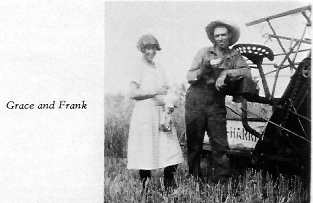
Dancing all night, getting home around six in the morning, they milked the cows, then did all the chores, putting the children to bed first. Then for a few hours sleep. Those were the good old days. As far as I can remember Frank telling me there the Martins, Dave Bristows, Jenners, Ole and Gus Johnson, George Newhouse, Holmeses and probably some I don't remember. Frank also told me that moose and deer came close up to the shack. Fred and Walter Johnson came after some time, also Ed Nelson. Frank told me one morning at sunrise, he looked out the window of the shack and there stood a moose, real close. Luckily he made a good shot, and so had winter's meat. Those days they shared with their neighbours.
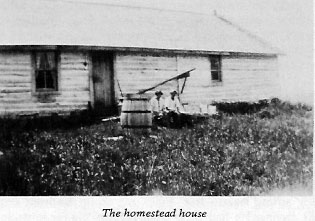
About 1915 Frank had to go to work again to get money to buy some more machinery, horses and seed grain for a few acres they had plowed. He came to Wellsdale, now Clandonald, and got work with Scotty Hope, our next neighbor. Scotty and a partner owned the Vermilion Hotel. They bought the farm from Jack Phillips so he came out to look after the farm and got a big herd of cattle. He had quite a time getting hired help, wages being very poor those days. So jokingly, I told him to get a nice young man and I would keep him there, which I did for about two years. I was quite a farm girl those days, and liked to work around cattle. So, when the cattle got in the crops, I fixed the fence. Frank saw me one day and helped me, then said he thought I would make a good wife. So, he brought me to his farm at Frog Lake, to see if I would like living there among the trees. I liked the place, with the house on the hill overlooking the creek down the valley to the river. After keeping him waiting for two years we decided to get married. It was war time, but Frank was turned down on account of having rheumatic fever. He was called to Edmonton for another test, so we postponed our wedding for a while. But they sent him back to the farm.
I came up to Frog Lake first in 1916. On August 7, 1918 we were married and I am still here in August 1975. Will and Annie were living on Frank's place as their house wasn't ready yet, so we lived together for six months, then they moved to their own farm, and we started farming on our own. The men divided up the cattle and horses, having a team of horses each and a couple of cows. My dad had given me a cow and a heifer, making us two milk cows. Also as wedding presents we were given six Leghorn hens and a Wyandotte rooster, giving us our first start with butter and eggs. We also had been given a canary to sing for us. We just had the bachelor furniture for a while, but managed real well. I remember Frank going to a sale and bringing home a rocking chair, the best piece of furniture I think I ever had.
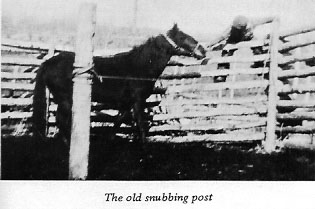
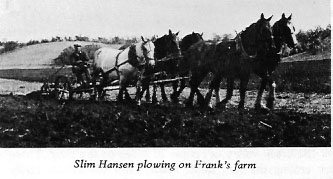
By now, by working out here and there, we had got our machinery, a walking plow with breaking and stubble attachments, iron-wheeled wagon, sleigh, and a set of diamond harrows. We made a stoneboat which was quite useful. We also had grubhoes, crowbars, axes, hammers and a bucksaw, which we used a lot, as we had to use wood for the heater and cookstove. The first winter Frank and I, not having too many chores, cut and sawed up a woodpile with the bucksaw - enough to last us a year. I forgot the binder, which Frank used to go and cut the neighbors grain with; in return they helped us stook. He had the first binder close around.
One thing in those days - most of us were all alike, not blessed with too many riches; so we gathered together in the form of a bee, the men helping to do anything needed, building or breaking land, going from one place to another. Also at threshing time. The women who could went to help the wife with the cooking or whatever had to be done and therefore had a good visit. If there was sickness we all went to help to do anything we could to help another, such as the men doing field work or haying, and the women helping with the little ones or washing, etc. We had Community Spirit those days. When babies were born we had Mrs. Sanders, Mrs. George Dewey, Mrs. Sillem, and Mrs. Boyd. The early doctors being the closest at Onion Lake, Vermilion, and St. Paul. Mrs. Dewey used to go and take over for the mother lots of time, staying until the mother was able to take over; riding home once in a while to see that her own family was fine, she rode a horse or a bicycle.
When we were breaking our land, we plowed up all kinds of Indian relics, stone tools, petrified things. The old Indians told us our land was a camping ground in the early days, having a flat and a creek for water. We gave the items to Tom Cowley as he was collecting these things. The first Christmas we went to my folks at Wellsdale as my brother Ed was getting married. Will and Annie were with us the first Christmas time so did the chores for us. We stayed until New Years Day, visiting around with friends. The girl I chummed with before I left home told us her father said that we had better start home, as the barometer said a bad storm was due. When we awoke on New Years morn it was snowing. Frank got the sleigh ready; lined it with hot rocks, lots of hay and blankets, hitched up the team. Our goodbyes said, we started off for home, which in those days, to me, seemed a long way. The storm got worse each mile we travelled. Luckily for us we had a strong, lively team. When we got to Dewberry it was a full-sized blizzard such as we used to have in those days, lasting three days. Frank covered me right over with blankets, then I got a covering of snow. He had a good buffalo coat, hat, fur mitts with home spun wool inner mitts so he didn't suffer too much from the cold. It took us most of the day and evening to get to Frog Creek. We sure thought then there was no place like "Home Sweet Home." Also, Will had a nice warm house for us.
Then we started to get some logs and rails to make an extra building and corrals. We also built a lot of rail fences, to save buying wire. By now we had got another cow or two, also some pigs and more chickens. I made butter, and sold some eggs, which I think at first we sold, or rather traded, to Mr. Heins. Then there was a store, just over the lake, east of us. It was owned by Sam Tarrabain and Abdou Saffa. Frank also trapped some weasel, coyote and muskrat; sold the furs to help pay our taxes. We could get most of the essential things we needed, such as groceries, shoes, rubbers, overalls, print goods, nails, axes, etc. We lived by trading until we got a calf or pig to take to Kitscoty, our nearest town, which at times we could not reach. If the wind was blowing the wrong way the ferry couldn't run. When Frank first came he had to go to Lea Park Post Office, which was south of the river, to get his mail. He paid 254 to cross each way. In the spring and fall the river was unsafe for weeks. Some of the neighbors' boys worked to get a calf or a pig, lumber or anything to help their families build up their homes.
My sister, Mabel, came to stay with us for a time before she was school age. Then my brother, George, came in the holidays each year until he left school. After a while he came to stay with us, helping Frank on the farm. After a few years he bought a farm close to us, a couple of miles north. He worked with Frank, still using our machinery until he got enough of his own. When George left us we managed to do the work with the help of some Indians for a few years. Then we had to hire more help, as Frank had a bad attack of rheumatism and, as we had no hospital, he had to be taken care of at home. Dr. Miller came down from Elk Point every few days to see him, driving his Hamiltonian team, which was a delight to see. George came to help us again, as he did many times after. We were lucky to get a good hired man, Slim Hansen, and he stayed with us for about six years. We sure missed him, as he was just like one of the family. Some time later Frank had a bad accident with the horses and was in hospital on and off for nearly a year. One day I was on the train coming back from seeing Frank, when who should I see but Slim. He had read in the paper that Frank had got badly hurt, so came back from Edmonton to help Pa and Ma; that is what he used to call us. This was in the fall and he stayed until May, and put our wheat in for us. We sure appreciated that. Then we had to start looking for another hired man, which was a problem those days, wages being only $20 to $25 a month, and long working hours.
My sister, Beatrice, came after she quit school, helping me, then worked for Mrs. Jenner Sr. Mabel came back after graduating and summer school. She taught school around here close to us and made her home with us until she got married. We also boarded another teacher, who taught at Norway Valley School, Miss Anna Wilson. She rode to school each day and some weekends to Mooswa, to visit the Arthur Bowtells. Then after a few years we had another teacher, Clara Bowen, who taught at Martin School. She used to walk to school. I remember one time Frank was in hospital again, this time with heart trouble, brought on by rheumatic fever. I had to stay in Elk Point and Mabel took over the housework, canning, baking bread and milking, with the help of Slim, also getting the cream shipped out. We were unfortunate not to have any family of our own; those days you could not adopt children unless you were both strong. Mabel and George were really our family, always looking after us, which I appreciate. Being alone, now, they are really my family.
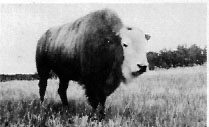
Catalo at Wainwright
Frank passed away in 1961, in January. George had helped us with haying and greenfeed, putting it up on shares. We had got quite a few cattle by now. So, having the feed close by, I could feed them when Frank was unable. He had made up his mind to get some Brangus cattle and kept them as a hobby. We thought they were good and sold our increase to others who wanted to try them. We sold them as calves, so Tom and Larry Kinch came down to help us break them to lead. The boys, not being very old, around ten or eleven, I got an Indian, Johnny Fryingpan to come and help them for a few days. They seemed to have lots of fun breaking them, but did a good job.
Sorry to say Frank did not live long to enjoy his hobby. I brought the Brangus up to George's and he crossed them with Shorthorns and eventually with Charolais, having good success. The boys used to keep me in wood, until after Frank died. One day near Christmas, I was completely out of wood and coal. The boys came down, no wood with them. They said, "We are going to take you to our place for your birthday and Christmas." That is how I came to leave my farm.
As I sit here reminiscing, I think of the time when Mabel was about six years old. We went to an entertainment at the Frog Lake School and there was a dance after. We were not ready to go home until early morning. It was in the middle of June and we had to drive the horses through the creek to water them. Down we went into the water and when the horses stopped short the spring seat bounced into the air, and sent us flying. We landed, Mabel head first in the creek, me after her. Frank had to pull Mabel out of the mud, leaving her nice blue hat in there. By the time I had walked up the hill, after wrapping Mabel in blankets, my clothes were frozen stiff. Imagine that in the middle of June!
I remember one winter soon after I came here. We had more produce than we could sell. Our neighbor, Jim Howse, started a stopping house for the Cold Lake fish haulers. There were about forty teams stopping to feed their horses or to stay over night. With the help of her daughter, Margaret, she made such big batches of bread, buns, pies and cakes to feed the men. The men hauled back groceries or freight.
I must mention a thing that happened to me in Elk Point. I met Mrs. Driver of Elk Point a few years ago and when we got talking she told me she had been in Frog Lake for two years in the twenties. I had not realized she was the lady that was at Abdou Tarrabain's Store. Her husband had been a fur buyer. We had a good visit about old times.
I must not forget also, my good neighbors, the Krider family. Amy and Sam were always ready to help me anytime I needed it. When Frank had a bad runaway with the horse rake, Sam was there in a few minutes to take Frank to the hospital. Also, when I was alone, the children were so good. I used to go up Christmas morning to see their tree. I love to be with the children at Christmas.
When Frank was in the hospital he met Dell Beebe, who was janitor and engineer, looking after the hot water system, as the hospital in those days was heated that way. He helped much the same as an orderly these days. He also looked after the flowers until Mrs. Hobden came. He was a real gardener. Dell used to ride horseback to our place, about thirty miles, on his days off, or for a week or so on holidays. Then, as time went by, he got a car. He brought some of the girls from the hospital who happened to have a day off, for a day in the country. We were glad to have them; I really enjoyed making a meal for them. Some from the city appreciated a farm meal; homemade bread, butter, canned chicken and meats, lots of green salads, fresh wild fruits and cream. People were not so fat-conscious those days. We also had a very good matron at the hospital, Miss Holter, she was more like a mother to us when we were sick.
Dr. F.G. Miller and his wife used to like to visit us. We would visit, have supper, then all sit on the hill, looking over the creek valley, a couple of miles to the river. These were among the rare times when I saw the doctor really relax and he would begin to sing and soon the rest of us would join in. How we enjoyed his fine baritone voice.
One of the many times he came to visit, to see Frank, sometimes on the way back from delivering a baby miles away from us; he had to feed his horses. This evening he came in quite late. I got him a lunch and fed his team. He sat in the old rocking chair and went to sleep. I asked him to stay and go to sleep for a few hours, but he said, "If I could lay down and go to sleep in a bed, I wouldn't call King George my uncle, but I have an important date with an expectant mother at Elk Point Hospital." Another time he had car trouble and had a day's work on the Indian Reserve, so my brother George drove him around with the team, and then he took the train home from Heinsburg. He slept on the train the rest of the night and went back to Elk Point in the morning.
One time a neighbor, Leif Pynten, took Frank on a trip to Elk Island Park. Frank took a picture of a catalo, a cross between a Hereford cow and a buffalo bull, as you will see in the picture. Leif and John Glambeck went on south to John's former farm. They brought back cactus and sage brush, the first I had ever seen, such a lovely large flower on the cactus, a beautiful yellow.
After Frank died I moved up to George's where I lived for a few years. Then Mabel moved to Elk Point and now I live between Elk Point and Frog Lake sometimes with one, sometimes with the other, and sometimes with my sister, Beatrice, who also lives in Elk Point. I fmd Elk Point a friendly town and have made some good friends here. There are also some who have moved in from Frog Lake. In 1971, I think that was the year, I was made Ati-yek Queen at the annual Elk Point Ati-yek Celebration. Now in my eightieth year, I hope to move into the Senior Citizens' Units here in Elk Point. But my heart and memories will always be in Frog Lake. Last year the Clubs (Martin and Frog Lake), gave me a lovely bouquet of roses on my birthday.
So, in ending my story, I must thank all who have helped me in writing this, also all my neighbors and relatives, who made my long and, I hope, useful life so pleasant.


